Proper post-operative care is essential for ensuring the healing and success of your dental implant. Follow specific guidelines regarding rest‚ diet‚ and wound monitoring to achieve optimal results.
Importance of Following Post-Op Instructions
Following post-operative instructions is crucial for ensuring proper healing‚ minimizing complications‚ and achieving the best outcomes for your dental implant. Adhering to guidelines helps prevent infection‚ promotes tissue healing‚ and reduces the risk of implant failure. Proper care also helps manage pain‚ swelling‚ and bleeding effectively. Ignoring instructions can lead to prolonged recovery or implant instability. By carefully following your dentist’s advice‚ you can ensure a smooth and successful healing process‚ ultimately leading to a durable and functional dental implant. Consistency and attention to detail are key to optimal results.
What to Expect After Dental Implant Surgery
After dental implant surgery‚ you may experience swelling‚ bruising‚ and mild bleeding‚ which are normal and temporary. Healing typically takes 1-4 months‚ depending on your body’s healing process. You might feel discomfort‚ managed with prescribed pain medication. A soft diet is recommended to avoid disrupting the implant site. Keeping your head elevated the first night can reduce swelling. Avoid strenuous activities and smoking‚ as they can hinder healing. Monitoring the implant site and following post-op instructions are vital for proper recovery. Be prepared for follow-up appointments to ensure everything is healing as expected.
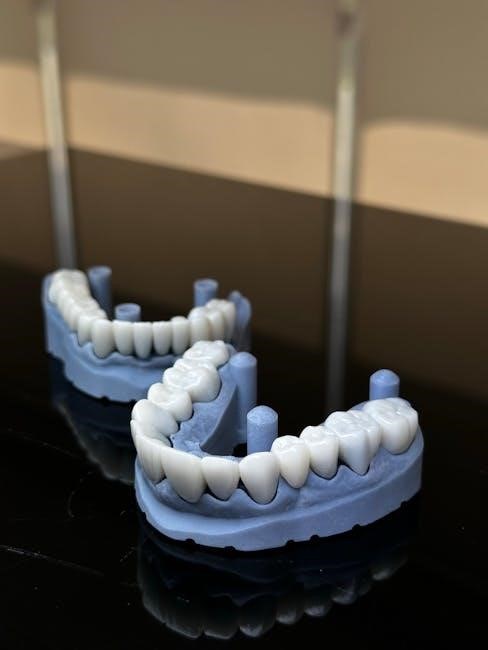
Immediate Post-Operative Care
After surgery‚ avoid disturbing the wound‚ rinsing‚ or spitting. Use a tissue to wipe your mouth‚ and avoid using a drinking straw to prevent dislodging the implant.
Rest and Recovery
Rest is crucial immediately after surgery to promote healing. Avoid strenuous activities for the first 24-48 hours and refrain from bending or heavy lifting. Keep your head elevated‚ especially during the first night‚ by propping it up with pillows to reduce swelling. Avoid turbulence in your mouth for at least 8 hours post-procedure. Light activities‚ such as reading or watching TV‚ are acceptable‚ but prioritize relaxation. Adequate rest ensures the implant site heals properly‚ minimizing complications and supporting a smooth recovery process.
Bleeding and Swelling Management
Mild bleeding is normal after dental implant surgery. Gently bite down on the gauze provided for 30-45 minutes to control blood flow. If bleeding increases‚ replace the gauze or use a clean‚ moist cloth. Avoid spitting or rinsing vigorously‚ as this can dislodge blood clots. Swelling typically peaks within the first 24-48 hours. Apply an ice pack wrapped in a cloth to the affected area for 15-20 minutes at a time to reduce swelling. Contact your dentist promptly if bleeding persists or if swelling worsens‚ as this may indicate complications requiring attention;
First Night Care: Elevating the Head
Elevating your head during the first night after dental implant surgery is crucial to minimize swelling. Use 2-3 extra pillows or a wedge pillow to keep your head at a 30-45 degree angle. This position helps reduce blood flow to the surgical area‚ promoting healing and comfort. Avoid lying flat‚ as it can increase swelling and discomfort. If you need to move‚ do so gently to prevent dislodging the blood clot. Keeping your head elevated throughout the night will aid in a smoother recovery and reduce morning swelling.
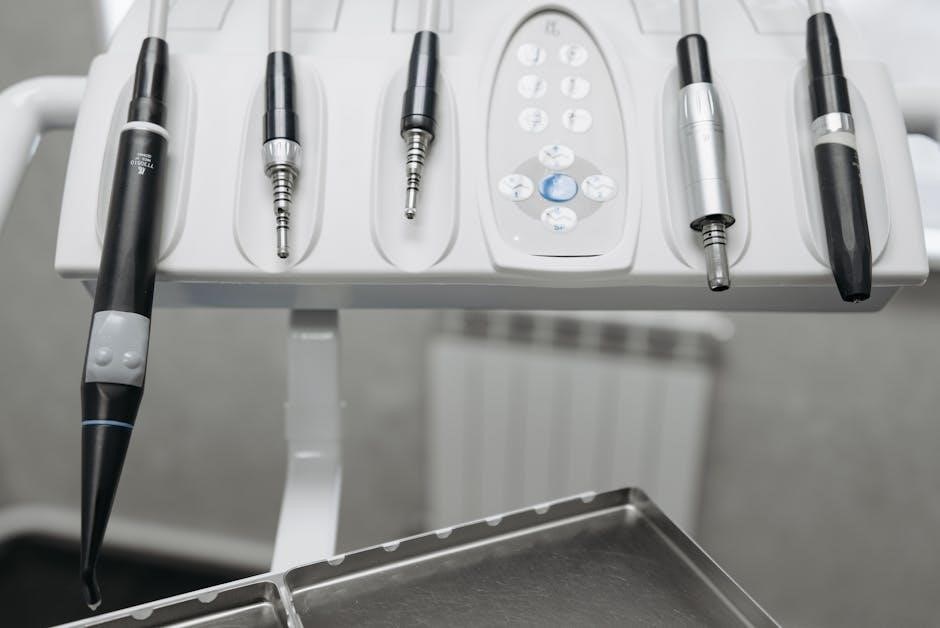
Pain Management
Pain management after dental implant surgery is crucial for recovery. Most patients experience mild discomfort‚ which can be controlled with prescribed medications. Follow your dentist’s instructions carefully to ensure effectiveness and safety.
When to Start Pain Medication
Pain medication should be taken as directed by your dentist‚ typically starting soon after surgery while the anesthetic is still active. This helps manage discomfort before pain begins. Always follow the prescribed dosage and timing to avoid complications. If no prescription is provided‚ over-the-counter pain relievers like ibuprofen may be recommended. Delaying medication can intensify discomfort‚ so start as instructed to stay ahead of pain. Monitor your response and consult your dentist if pain persists or worsens. Adhering to their guidance ensures a smoother recovery process.
Recommended Pain Relief Options
For managing pain after dental implant surgery‚ your dentist may recommend over-the-counter pain relievers like ibuprofen or naproxen. These are effective for mild to moderate discomfort and can also reduce inflammation. In cases of severe pain‚ prescription-strength medications such as narcotics may be prescribed. Always follow the dosage instructions provided by your dentist. It’s important to avoid overusing narcotics and to consult your dentist before combining medications. Adhering to these recommendations ensures proper pain management while minimizing potential side effects or complications during recovery.
Managing Side Effects of Pain Medication
Common side effects of pain medication include nausea‚ dizziness‚ or stomach discomfort. To manage these‚ take medications with food or milk to reduce stomach irritation. Stay hydrated to prevent constipation‚ a side effect of narcotics. If dizziness occurs‚ avoid standing quickly and rest in a seated or lying position. Over-the-counter remedies like antihistamines or anti-nausea medications may help‚ but consult your dentist before adding new medications. If side effects persist or worsen‚ contact your dentist for alternative solutions. Always follow prescribed dosages and avoid combining medications without professional advice.
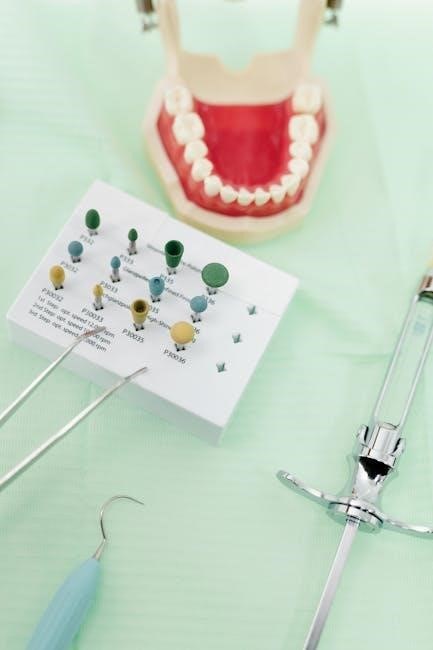
Dietary Guidelines
Focus on soft‚ nutrient-rich foods like yogurt‚ soups‚ and mashed vegetables to minimize discomfort. Avoid hard‚ crunchy‚ or sticky foods that could disrupt the implant site. Stay hydrated with fluids to support healing and overall recovery. Choose foods that are easy to chew and swallow‚ ensuring proper nutrition without straining the surgical area. A balanced diet aids in faster healing and prevents complications.
Soft Diet Recommendations
After dental implant surgery‚ opt for soft‚ easy-to-chew foods to minimize discomfort and protect the implant site. Yogurt‚ scrambled eggs‚ and mashed potatoes are excellent choices. Soft fruits like bananas or applesauce are also ideal. Smooth soups and pureed vegetables provide essential nutrients without requiring heavy chewing. Incorporate protein-rich foods like soft-cooked chicken or fish to support healing; Avoid hard‚ crunchy‚ or sticky foods that could disrupt the implant. Stay hydrated with water‚ clear broths‚ or herbal teas. Blending meals or using a food processor can help maintain nutrition while keeping foods gentle on your mouth. Proper hydration and nutrition are key to a smooth recovery.
Foods to Avoid During Recovery
Avoid hard‚ crunchy‚ or sticky foods that could irritate the implant site or disrupt healing. Hard nuts‚ raw vegetables‚ and crunchy snacks should be avoided for several weeks. Chewy candies‚ caramels‚ and tough meats can also pose risks. Additionally‚ refrain from consuming spicy or acidic foods that may cause discomfort. Avoid drinking through a straw‚ as the suction can dislodge the blood clot. Stay away from hot beverages for 24 hours post-surgery. Adhering to these restrictions helps ensure proper healing and prevents complications. Stick to a soft‚ gentle diet to support recovery and protect your dental implant.
Hydration Tips
Staying hydrated is essential for healing and recovery after dental implant surgery. Drink plenty of water‚ herbal teas‚ or clear broths to maintain fluid intake. Avoid using straws‚ as the suction can dislodge the blood clot. Opt for room-temperature beverages‚ as hot liquids may cause discomfort. Incorporate electrolyte-rich drinks to replenish salts and maintain balance. Avoid alcohol and caffeine‚ as they can dehydrate you and slow healing. Sip fluids gently and avoid tilting your head backward while drinking. Proper hydration supports the body’s natural healing processes and helps prevent dry mouth‚ promoting a smoother recovery.
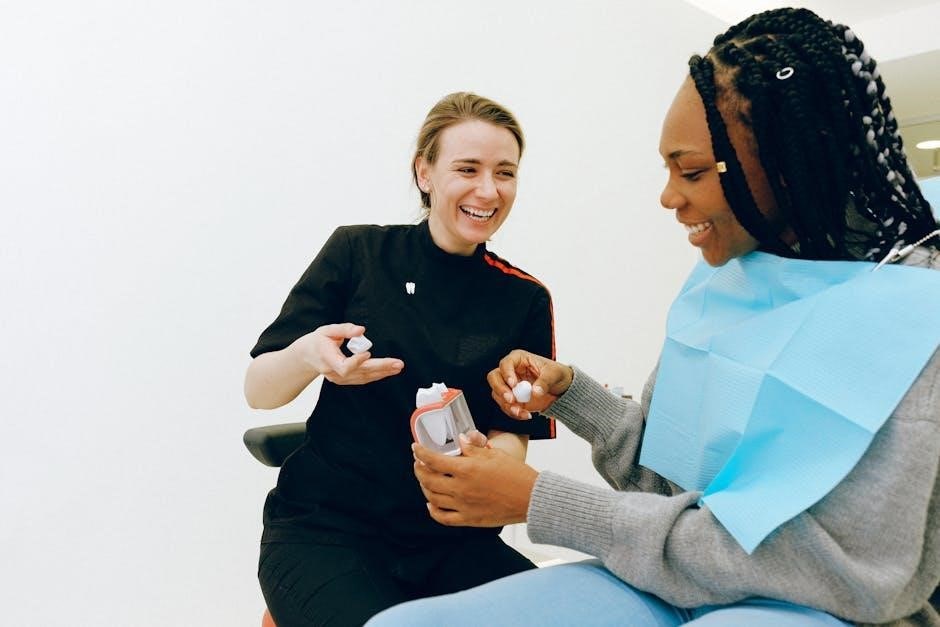
Oral Hygiene
Proper oral hygiene is crucial for healing and preventing infection after dental implant surgery. Keep the mouth clean‚ avoid disturbing the implant site‚ and follow your dentist’s specific advice.
Gentle Mouth Cleaning Techniques
Use a soft-bristled toothbrush to clean teeth gently‚ avoiding the surgical site. Start with light strokes and gradually increase as healing progresses. Avoid using abrasive toothpaste or harsh mouthwashes. For the first few days‚ rinse with a saline solution (1 teaspoon of salt in warm water) to keep the area clean. Gently swish the solution around your mouth before spitting it out. Avoid vigorous spitting or rinsing‚ as this could dislodge the blood clot. Use a clean‚ damp cloth to wipe the implant site if needed. Maintain good oral hygiene to promote healing and prevent infection.
When to Resume Brushing
Typically‚ light brushing can resume 24-48 hours after surgery‚ but avoid the implant site. Use a soft-bristled toothbrush and gentle strokes to clean adjacent teeth. Start with minimal pressure and gradually increase as comfort allows. Avoid brushing directly over the surgical site until advised by your dentist. For the implant area‚ use a gentle cleanser or mouthwash as recommended. Proper oral hygiene supports healing‚ but be cautious not to disrupt the implant or surrounding tissue. Always follow your dentist’s specific guidance for resuming normal brushing routines.
Saline Rinses for Healing
Saline rinses are crucial for promoting healing after dental implant surgery. Start rinsing gently with warm salt water (1/2 teaspoon of salt in 8 ounces of water) 24-48 hours post-surgery. Rinse 2-3 times daily‚ especially after meals‚ to remove debris and bacteria. Avoid vigorous swishing or spitting‚ as this may dislodge the blood clot. Saline rinses help reduce swelling‚ prevent infection‚ and promote a clean environment for healing. Continue this practice for 1-2 weeks or as directed by your dentist to support optimal recovery and minimize complications.
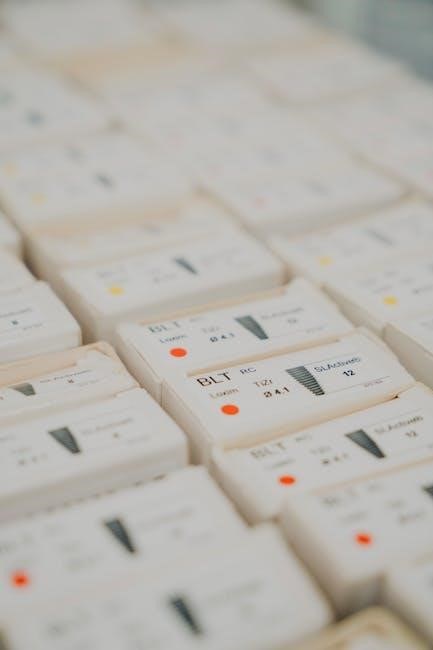
Swelling and Bruising
Swelling and bruising are natural responses to surgery. Apply ice packs to reduce swelling‚ and follow your surgeon’s instructions to minimize discomfort and discoloration.
Normalizing Swelling After Surgery
Swelling after dental implant surgery typically peaks within 24-48 hours and gradually subsides. To normalize swelling‚ apply ice packs to the affected area for 15-20 minutes‚ repeating every hour during the first 24 hours. Keep your head elevated using extra pillows to reduce blood flow to the surgical site. Avoid strenuous activities that could increase swelling. Gently massage the area with a soft cloth if recommended by your dentist. Most swelling resolves within 7-10 days‚ but mild puffiness may linger. Monitor for excessive swelling or redness‚ as these could indicate complications. Contact your dentist if swelling persists or worsens.
Reducing Bruising and Discoloration
Bruising and discoloration after dental implant surgery are common due to blood leakage into tissues. To reduce their appearance‚ apply ice packs to the affected area for 15-20 minutes several times daily. Elevate your head using extra pillows to minimize blood flow. Avoid direct pressure on the surgical site. Arnica gel or topical creams‚ if recommended‚ may help reduce bruising. Stay hydrated to promote healing. Bruising typically fades within 10-14 days. Gentle massage with a soft cloth‚ if advised‚ can aid recovery. If discoloration worsens or persists beyond two weeks‚ consult your dentist to rule out complications.

Healing Process
The healing process after dental implant surgery involves osseointegration‚ where the implant fuses with the jawbone. This critical phase ensures stability and long-term success‚ requiring patience and proper care.
Understanding the Healing Timeline
The healing timeline for dental implants typically spans several months. Immediately after surgery‚ the body begins the healing process‚ with clot formation and initial tissue repair occurring within the first week. Over the next few weeks‚ soft tissues heal‚ and the implant starts integrating with the jawbone. Osseointegration‚ the process of bone fusing to the implant‚ usually completes between 3 to 6 months. After this period‚ the implant is stable enough for the final crown placement. Proper care during this timeline is essential for optimal healing and long-term success. Following post-op instructions ensures a smooth recovery and durable results.
Monitoring the Implant Site
Monitoring the implant site is crucial for ensuring proper healing and detecting potential issues early. Patients should check for signs of redness‚ swelling‚ or unusual discharge‚ which may indicate infection. Gently rinsing with saline solution can help maintain cleanliness. Avoid touching or applying pressure to the implant area‚ as this could disrupt the healing process. If any unusual symptoms persist‚ contact your dentist promptly. Regular follow-ups are essential to assess the implant’s integration and overall recovery progress. Proper monitoring supports a successful outcome and prevents complications.

Activity Levels
Rest is essential immediately after surgery. Avoid strenuous activities for 48-72 hours. Light activities can gradually resume as healing progresses.
Avoiding Strenuous Activities
Avoid strenuous activities‚ such as heavy lifting‚ bending‚ or exercise‚ for at least 48-72 hours after surgery. These actions can dislodge the blood clot‚ causing bleeding or delaying healing. Stick to light activities like walking or reading. Avoid activities that raise heart rate or blood pressure. Rest is crucial during the initial healing phase. After 7-10 days‚ gradually resume normal activities as comfort allows. Always listen to your dentist’s specific advice‚ as recovery timelines may vary. Prioritizing rest ensures proper healing and minimizes complications.
Returning to Normal Activities
Most patients can return to normal activities within a few weeks after surgery. Light exercises and daily routines can typically resume once swelling subsides and discomfort decreases. However‚ avoid activities that directly stress the implant site. Heavy lifting‚ bending‚ or intense workouts should be postponed until your dentist confirms healing progress. Listen to your body and gradually increase activity levels to prevent overexertion. If discomfort arises‚ pause and consult your dentist. A balanced approach ensures a smooth transition back to normal life without jeopardizing the implant’s success.

Lifestyle Adjustments
Adopting healthy habits supports healing. Avoid smoking‚ as it hinders bone integration‚ and limit alcohol to prevent complications. Maintain good oral hygiene and overall health.
Smoking and Its Impact on Healing
Smoking significantly impairs the healing process after dental implant surgery. It reduces blood flow to the gums and bone‚ delaying recovery and increasing the risk of complications. Nicotine restricts oxygen delivery‚ which is essential for tissue repair and bone integration with the implant. Smoking also raises the likelihood of implant failure‚ infections‚ and dry socket. Patients are strongly advised to quit smoking before and after surgery to ensure proper healing and long-term success of the implant. Discussing a smoking cessation plan with your dentist can help improve recovery outcomes and overall oral health.
Alcohol Consumption Guidelines
Avoid consuming alcohol during the initial healing period after dental implant surgery‚ as it can interfere with recovery. Alcohol thins the blood‚ increasing the risk of bleeding and delaying clot formation. It also irritates the surgical site‚ potentially leading to prolonged healing times. Additionally‚ alcohol can interact with pain medications‚ causing adverse effects or reducing their effectiveness. It is advisable to refrain from alcohol until your dentist confirms the healing is progressing well. Consulting your dentist for specific timelines and guidelines on alcohol consumption is recommended to ensure optimal recovery and implant success.

Follow-Up Appointments
Regular follow-up appointments are essential to monitor healing progress and ensure proper implant integration. Attend all scheduled visits to address concerns and confirm recovery milestones.
Importance of Post-Op Check-Ups
Post-operative check-ups are crucial for ensuring the success of dental implant surgery. These visits allow your dentist to monitor healing‚ check implant stability‚ and address any concerns. Early detection of complications‚ such as implant failure or infection‚ can prevent more invasive treatments. Regular follow-ups also ensure proper osseointegration‚ the process where the implant fuses with the jawbone. Attending scheduled appointments demonstrates commitment to a smooth recovery and long-term oral health. Neglecting follow-ups may lead to unforeseen issues‚ emphasizing the importance of adhering to your dentist’s recommended schedule for optimal outcomes.
What to Expect During Follow-Up Visits
During follow-up visits‚ your dentist will assess the healing progress of your dental implant. They will check the implant’s stability‚ ensure proper integration with the bone‚ and monitor the surrounding tissue health. X-rays may be taken to evaluate the implant’s position and fusion. Sutures‚ if used‚ may be removed during these visits. Your dentist will also discuss next steps‚ such as abutment placement or crown attachment. These visits are routine and help ensure everything is progressing as expected. They also provide an opportunity to address any concerns or questions you may have about your recovery.
Adhering to post-op instructions ensures proper healing‚ functionality‚ and a natural appearance of your dental implant‚ balancing rest and normal activities for optimal long-term success.
Key Takeaways for a Smooth Recovery
- Follow post-op instructions meticulously to ensure proper healing and functionality.
- Prioritize rest‚ manage pain‚ and maintain a soft diet during the initial recovery phase.
- Practice gentle oral hygiene to prevent infection and promote healing.
- Attend all follow-up appointments to monitor progress and address concerns early.
- Avoid smoking and alcohol to enhance healing and prevent complications.
- Stay hydrated‚ avoid strenuous activities‚ and elevate your head at night to reduce swelling.
- Monitor the implant site for signs of infection or irregular healing.
- Resume normal activities gradually‚ ensuring the implant has fully integrated.
Final Tips for Optimal Healing
For the best recovery‚ monitor the implant site daily for signs of healing progress. Stick to a soft-food diet until advised otherwise and avoid chewing directly on the implant. Refrain from smoking or using tobacco products‚ as they hinder healing. Keep the mouth clean with gentle rinses and avoid alcohol for at least a week. Attend follow-up appointments without fail to ensure everything is healing properly. Be patient‚ as full integration takes time. By adhering to these guidelines‚ you can ensure a successful and complication-free recovery.



